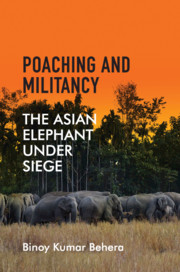4 - Poaching and Militancy
Published online by Cambridge University Press: 23 November 2018
Summary
Originally, an elephant reserve and hunting ground for royalty, Simlipal in the Mayurbhanj district of Odisha was formally declared a tiger reserve in 1956 and was among the first lot of tiger reserves in the country brought under Project Tiger after its formation in 1973.
As per official records, there had been 24 cases of tusker poaching in and around the Simlipal Tiger Reserve from 1990–91 to 1999–2000 at an average of 2.4 per year. In 9 years from 2000–01 to 2008–09, there were 23 cases at an average of 2.6, while in 3 years after 2009, the killings jumped to 18 cases at an average of 6 a year. Incidentally, these figures do not reflect tuskers that might have been killed but did not come to official notice in the aftermath of the Naxalite mayhem of 2009. A fact-finding team that visited Simlipal in June 2010 reported that there were estimated 18 elephant killings in just one month or so prior to its visit.
Simlipal Tiger Reserve came under a series of concerted, well-orchestrated armed left-wing Naxalite attacks in late March 2009, to April, most of which happened over a few days beginning the night of 28–29 March. Seventeen criminal cases were registered in all by the district police. As wildlife officials manning the reserve lost control, the sanctuary where there were already reports of poaching became a veritable haven for poachers targeting its two principal residents, the tusker elephant and the tiger. It was the brazenness of the elephant killings detected in April–May 2010, a year after the attack by militants that prompted the National Tiger Conservation Authority (NTCA) to constitute an independent assessment team in June 2010, to analyse the situation.
The team visited the Simlipal Tiger Reserve from 6 to 11 June 2010, and did an appraisal on the state of poaching in and around the park. Relevant portions of the report will be referred to where pertinent, but the author shall primarily draw on his own experience and association with Simlipal over more than 25 years to come to some understanding and assessment of the situation. This association began in 1988 when the author was posted as Superintendent of Police at Baripada in Mayurbhanj, the district where the Simlipal Tiger Reserve is located.
- Type
- Chapter
- Information
- Poaching and MilitancyThe Asian Elephant under Siege, pp. 85 - 113Publisher: Cambridge University PressPrint publication year: 2019



